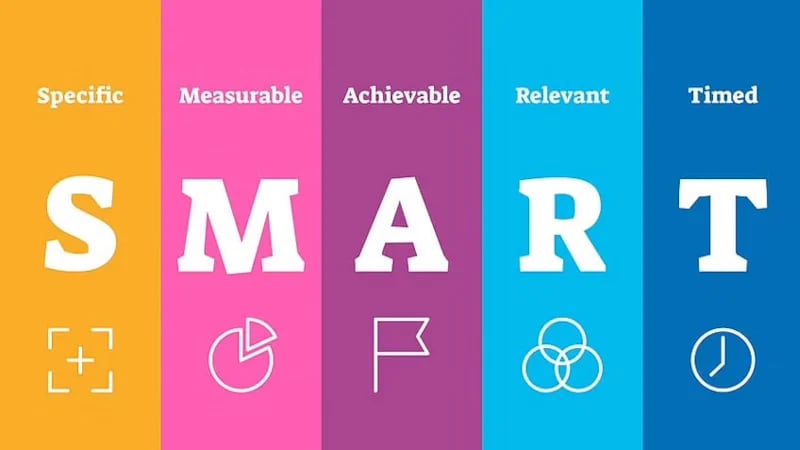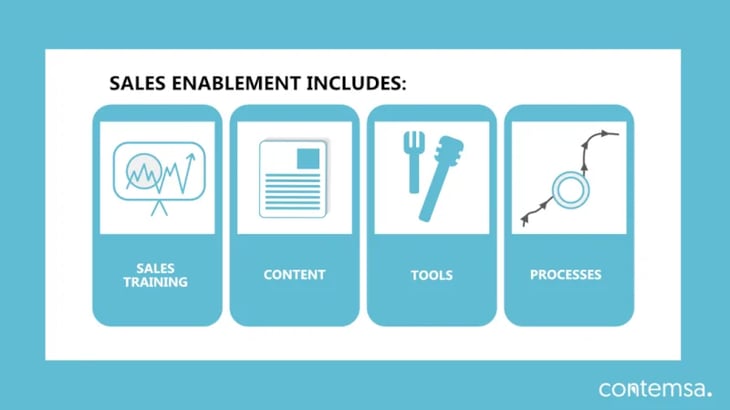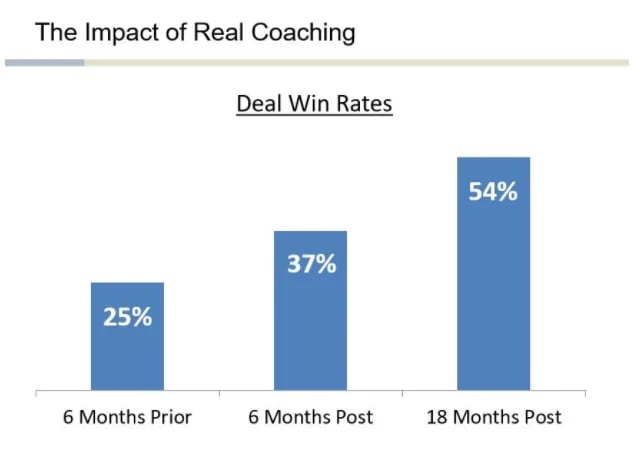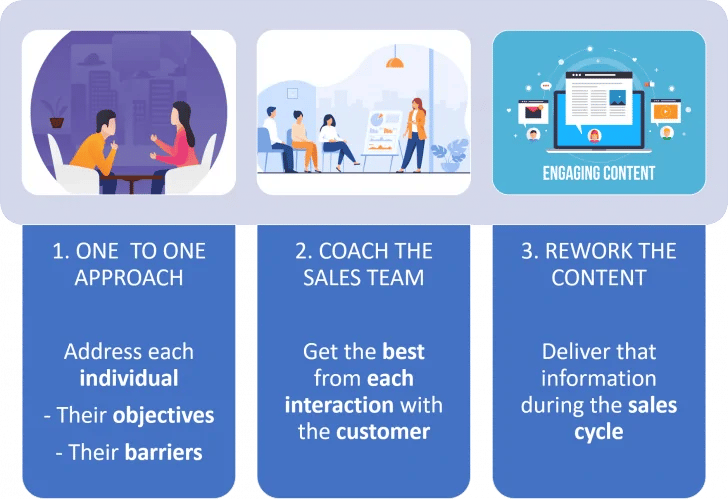To unlock the potential of your sales reps, you need to implement a solid sales strategy. An essential aspect of your strategy is motivating and educating your team with effective sales coaching techniques.
Make your training the first step in enhancing the sales experience. Prioritize building your reps’ skills to help them to become sales pros.
The objectives of sales coaching
Your coaching tactics should not only turbo-boost sales but also motivate and encourage your reps. As a sales coach, your team looks to you for guidance. Humanize your sales strategies with proper sales rep training.
Sales coaching techniques will prepare your reps and equip them with the skills they were hired to use.
Keep these objectives at the forefront of your mind when devising your sales strategy:
Improve sales skills across the team – Although some people may be more naturally-attuned to selling, sales is a learnable skill. It is your job to teach this skill to maximize sales.
To reinforce training on long-time sales reps – Over time, skills can become outdated. Your reps’ sales skills need to be refreshed at regular intervals with reinforcement.
To identify the weak and strong spots of reps – Even the most seasoned reps will have weaknesses within their methods. Identify strengths and weaknesses, so you can build up each rep to a high standard.
To promote accountability – Every rep needs to feel accountable for their sales. Taking responsibility for their performance will motivate them to work hard.
To help sales reps reach their career goals – As a coach, you should encourage a growth mindset within your sales team. Help your reps reach their full potential and meet their career goals.
10 easy and effective sales coaching tips for an optimized sales team
According to a report by CSO Insights, a dismal 62% of companies do not implement formal sales coaching strategies within their sales teams. The same report found that companies opting for a dynamic and formal coaching system enjoyed a win rate of 55.2% and 48.9%, respectively.
Those companies that offer informal coaching have an average win rate of 47.8%. And those with a random coaching system have a win rate of just 41.8%.
If you have a strong blueprint with effective sales coaching techniques, your company could be among those reaping these impressive financial rewards.
With that in mind, here are ten simple sales training techniques that can help you skyrocket your sales figures:
Set your team’s sales goals
The first of our simple sales coaching techniques is to set goals. Goals are vital for virtually every aspect of your business. To improve your sales, your team needs goals to work towards. Consider using the S.M.A.R.T goal model. That is:
- Specific
- Measurable
- Achievable
- Relevant
- Time-based

Not only are goals there to measure success, but they are also excellent motivators. Set goals that are based on your team’s skill level. They should be challenging but realistic.
Once the goals are set out, use task management software to monitor individual and team progress.
Build a sales fundamentals foundation
Teaching hardcore sales skills is great. But your team needs a foundation to build on. When it comes to sales coaching techniques, the basics should always come first. Having a strong grasp of the fundamentals of sales is your first port of call.
If you go straight for the tricky stuff, you will have team members who lag behind because they cannot keep up with the rest.
Lay the foundation of what it means to be a good sales rep. Teach basic concepts and ensure everyone understands these before moving on to more advanced skills and techniques.
This can be used in conjunction with techniques to increase online sales, such as improving your website’s SEO or installing chatbots so that you appeal to a wider customer base with varying degrees of familiarity with your brand and website.
Ask each rep to create their own action plan
Asking your reps to create their own action plan will encourage them to reflect on their strengths and weaknesses, a vital step towards improvement.
If you want your reps to overcome sales objections, ask them to put a plan in place to improve their sales strategies.

This is one of the most powerful sales coaching techniques out there. It will help your reps take responsibility for their learning and development. Get them to consider the steps they can take to achieve their sales goals and boost sales enablement. Writing down their plans will strengthen their commitment to them.
Devote time to sales team sessions
Even though you’re the coach, your team won't solely gain valuable information from you. They will also benefit from learning from one another. As part of your sales coaching strategy, you should organize team sessions.
Your reps will likely encounter similar experiences to each other, whether they are positive or negative. Team sessions will enable the team members to talk these through and come up with solutions together. These sessions can be held in person or virtually. Moving forwards, the impact of the metaverse for event planners will surely increase the number of virtual sessions and events taking place.
Consider encouraging your team to practice their sales techniques with three-way calling, with two people role-playing and another listening to provide feedback. This may spark inspiration, highlight where improvements can be made, and give your team fresh ideas of what to say and do in different circumstances.
Use data to analyze performance
What good is performance that is not measured?

Gather data to analyze performance. Performance should be measured on an individual basis and as a team. Identify any areas that need to be improved and reward good work to keep up the momentum. Your first step is to determine what data you will analyze. Consider metrics such as:
- Win rate
- Time to close deals
- Sales revenue
- New vs. existing customers' sales ratio
Put your data into reports and see which areas you need to focus on more. Sales forecasting on Excel is a great way to keep track of sales and performance.
Encourage your reps to self-evaluate
Self-evaluation is a powerful thing. It helps us to take stock of our skills and drives us toward our goals. Self-evaluation is the first step toward improvement.
However, self-evaluation is a skill in itself. It’s not always easy to see – and admit to – your strengths and weaknesses. As part of your sales coaching techniques, give your reps your full support in self-evaluating. But be sure they come up with points themselves, though. Giving them your perspective on their skills will undermine the process.
Build trust through authenticity
People warm to people they can relate to. They like to feel they are not the only ones who have experienced specific problems, whether that be in the sales game or other areas of their life.
Discuss your personal experiences with selling. Give real examples and stories of challenges you’ve faced and how you’ve overcome them.

Firstly, this builds rapport. The authenticity you demonstrate will build trust and make you a relatable coach.
Secondly, discussing your problems and how you dealt with them will inspire your team. If someone has a problem, they may feel alone and that there’s no way to get passed it. Your personal experiences of conquering those issues will help them see that it can be done.
Furthermore, you will provide practical advice that your team can use to optimize sales engagement. And hopefully, excel in the sales field.
Take a customized approach for each rep
No two people are the same. We all know this. But, from a coaching perspective, it can be easy to fall into the trap of treating your team as one entity. Rather, you should be treating each team member as the individual they are.
You do this with a customized coaching approach.
From a psychological perspective, there are five main learning theories:
- Behaviourism – stimulus-response
- Cognitivism – flow of knowledge
- Constructivism – mental models
- Experientialism – learning through experience
- Social & Contextual – learn from and with others.
While you don’t necessarily need to know these in-depth, it’s worth keeping in mind that different people have different ways of learning and absorbing new information. What works for one may not be the best approach for someone else.
Therefore, pay attention to what skills your reps exhibit after training sessions. Customize their learning according to what delivers the best results.
Be accessible outside team or individual sessions
Be the go-to person that your team can rely on when they need you. You shouldn’t be strict with your schedule, only allowing contact when it suits you. Your reps need to know they can come to you as and when they need some guidance or encouragement.
Furthermore, one-on-one time can be really beneficial. Take the time to organize individual sessions so you can focus solely on each rep and their development.

Remembering lots of details about lots of individuals can be overwhelming, though. Consider taking notes or monitoring calls so that you can refer back to the conversation at a later date.
Being accessible will provide your reps with the opportunity to ask questions they may not feel comfortable discussing in a group. Your reps will benefit from your undivided attention. Plus, you will get to know each other on a more personal level.
Encourage reps by offering professional development opportunities
Continuous development is essential for meeting those career goals. It helps to keep your reps motivated and excited about their chosen path. One of your sales coaching techniques is to ensure they have opportunities to continually develop their skills and knowledge.
Whether your reps cold call using PBX phone systems for small businesses or sell your products through face-to-face interaction, continuous development will do wonders for their confidence in sales.
This will benefit you, the company, and your reps. Set out development paths and milestones, so your reps know what they’re aiming for. And ask them their thoughts about what they want to learn and how they envision their improvements.
Final thoughts
Sales coaching is a crucial aspect of successful sales. These sales coaching techniques are simple and effective. Draw up a plan of action. Share it with your reps, so they know what to expect and when.
And finally, don’t be tempted to skimp on the training. It will pay off.




